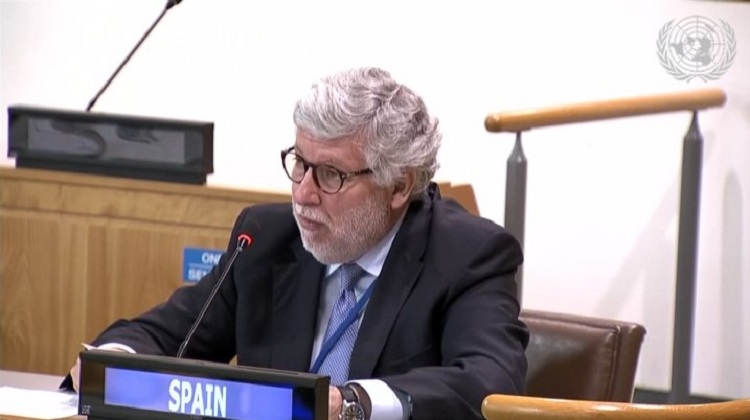Eduardo González
The Spanish-British agreement on Gibraltar starred yesterday both the meeting held in Brussels between the President of the Government, Pedro Sánchez, and the British Prime Minister, Boris Johnson, and the meeting of the UN Decolonization Committee.
As reported by Sánchez on his Twitter account, the head of the Executive held a meeting with Johnson in the margins of the NATO Summit, in which they addressed “the need to further strengthen bilateral relations, deepening in areas such as security and defense, and promote the agreement between Spain and the United Kingdom regarding Gibraltar”. In addition, and as reported by the British Government, “they agreed that the political agreement on Gibraltar, reached on 31st December, provided a framework for a future agreement with the EU and the Prime Minister thanked Prime Minister Sanchez for his pragmatic approach on this issue”.
Subsequently, the Gibraltarian government assured that both the chief minister, Fabian Picardo, and the deputy chief minister, Joseph Garcia, were “aware” of the meeting between Johnson and Sanchez and even “have worked with Foreign Commonwealth and Development Office colleagues in preparation for the meeting”.
The Rock’s Executive also indicated that, although the meeting “was not specifically about Gibraltar”, it did serve for both parties to commit to address this issue “in an encouraging positive spirit of optimism”. “I am happy that Gibraltar was raised in keeping with our expectations and the work we have been doing, to point optimistically towards the negotiation to come between the UK and the EU to deliver on the New Year’s Eve Framework Agreement”, said Picardo
Decolonization Committee
On the other hand, the Spanish-British agreement was also discussed yesterday during the meeting of the Special Committee on Decolonization (C-24) of the United Nations, during which the Spanish Ambassador to the United Nations, Agustín Santos, lamented the lack of progress in “an anachronistic colonial situation that my country continues to suffer in the 21st century and which results in the maintenance of the only existing colony on the European continent”, lamented the lack of progress in “an anachronistic colonial situation that my country continues to suffer in the XXI century and that results in the maintenance of the only existing colony on the European continent”, and recalled that the UN itself “has recognized on numerous occasions the specificity of the decolonization process of Gibraltar, noting that the colonial situation of Gibraltar undermines the territorial integrity of Spain”.
“My country maintains that the definitive solution involves the restitution of the territory, both the territory ceded under the Treaty of Utrecht, as well as that which was subsequently occupied illegally and without any title by the United Kingdom”, he warned. “Spain, as this Commission is well aware, has never relented in its negotiating efforts”, and is “also willing to reach agreements with the United Kingdom that allow regional cooperation schemes for the direct benefit of the inhabitants on both sides of the fence under the idea of shared prosperity”, Santos continued.
Therefore, he explained, “in the framework of negotiations to ensure an exit of the United Kingdom from the European Union as orderly as possible, Spain and the United Kingdom negotiated an International Agreement in relation to Gibraltar on taxation and four Memoranda of Understanding on citizens’ rights, police and customs cooperation, environment and tobacco and other products that have been of application in Gibraltar in order to alleviate some of the most negative effects of Brexit”, he explained. Apart from that, he explained, “last December 31, 2020 Spain and the United Kingdom reached an understanding regarding Gibraltar that should serve as the basis for a future Agreement between the European Union and the United Kingdom in relation to Gibraltar”.
However, he warned, “nothing in that understanding nor any action or measure taken in application or as a result of it, implies a modification of the legal position of Spain with respect to sovereignty and jurisdiction in relation to Gibraltar”, because “there is no other solution to the Gibraltar dispute than a decolonization process negotiated between Spain and the United Kingdom, in the terms established by the United Nations”.
For his part, the representative of the Government of Gibraltar in the United States, David Guerrero Listón, insisted before the Committee that the Rock should have “the opportunity to exercise the right to self-determination, as many of the countries represented here today have done before us“.
He also assured that “the COVID-19 pandemic has also fostered close cooperation between Gibraltar and Spain” and that the transition period opened after the exit of the United Kingdom from the EU has served to “agree the text of a Framework Agreement for a treaty on the future relationship of Gibraltar with the European Union”, in whose negotiations “the Government of Gibraltar participated (…) together with the United Kingdom and Spain”. The cooperation developed in these months has “contributed to reduce the understandable distrust that has been forged for decades between Gibraltar and Spain” and, “at present, Gibraltar exerts a positive economic effect in Spain”, he continued. As such, “the interests of citizens and businesses on both sides of the border would benefit significantly from the security provided by a new treaty” which “should lay the foundations for an era of even greater prosperity for both sides”, he concluded.






